Systemic Justice’s Founder, Nani Jansen Reventlow, delivered the keynote address at the Public Law Project’s annual conference. Here’s her speech:
Thank you so much for the opportunity to speak today, on this anniversary edition of the Public Law Project’s annual conference. It is an honour – and slightly daunting – to be given the microphone after a day filled with so many fabulous speakers.
I am very excited to have been asked to speak about the future of strategic litigation.
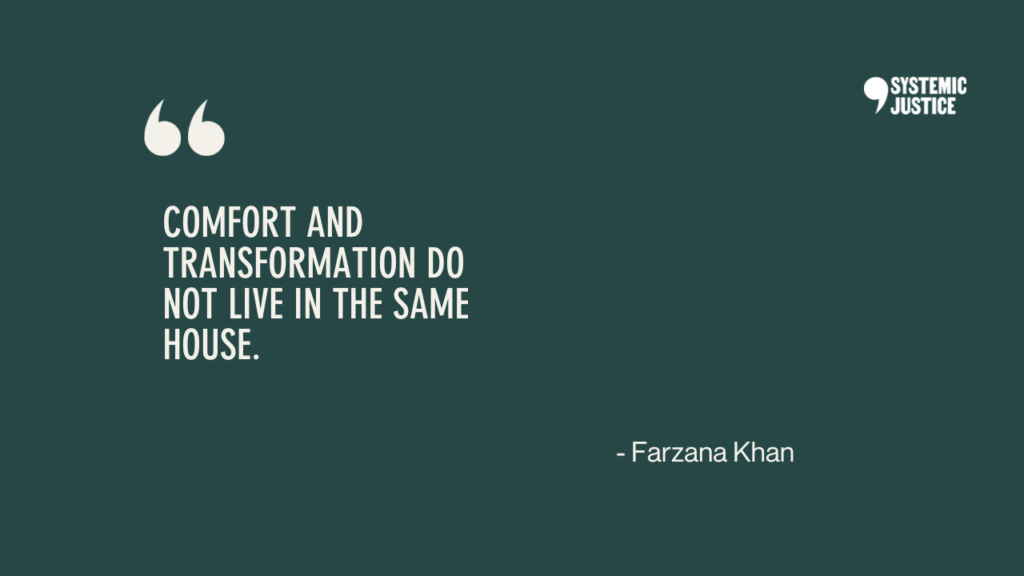
I realise, however, that not everyone may be excited to listen to me as in the next 30 minutes I will be sharing some uncomfortable truths. I don’t expect everyone to agree with me, and that is ok. What I do ask of you is to, if you can, where you feel resistance, to not immediately dismiss it, but take a moment – maybe later, on your way home – to sit with it and examine where the discomfort comes from.
Before I start, I want to make clear that I am not speaking from a misguided conception that I have all the answers. I do not. What I do have is 15 years of experience of practicing as a lawyer, funding litigation, and teaching and training on strategic litigation, as a Black woman, and in a multitude of contexts. This, combined with experience initiating decolonising work, a journey of learning and unpacking what my own positionality means in my work as a lawyer, and a lot of talking, thinking, and plotting with co-conspirators, has brought me to a place where we as a team at Systemic Justice want to at least try to do things differently – to radically change how the law works for communities fighting for racial, social, and economic justice.
So what I will be sharing today is a critique and a vision, combined with suggested ways forward for all of us – lawyers, communities, NGOs, judges – to shape a future that looks very different from the present we’re operating in. A future where communities are able to include strategic litigation in their campaigns for change on their own terms, and where they are able to remain in their power throughout the process.
The problem: looking at justice through a “law first” lens
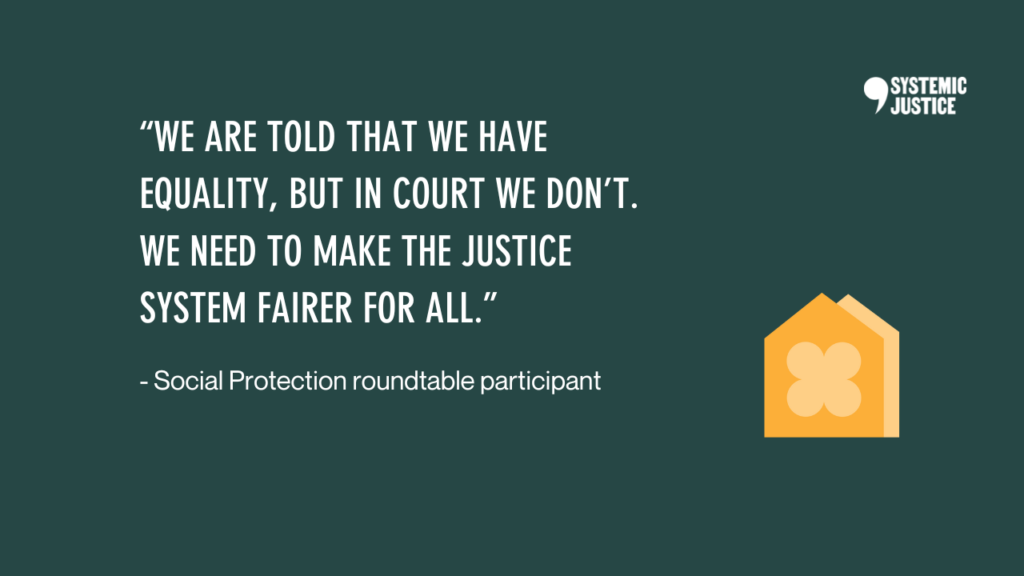
“There are lots of legal and human rights frameworks that could be used to fight for justice. There is a lot of justice spelled out on paper that is not being applied in practice.” – Climate justice roundtable participant
“We have the feeling that strategic litigation is something very big and distant, out of reach for most grassroots collectives.” – Survey respondent
“[I]t felt very extractive and like they were shopping for cheap cases to widen their portfolio rather than actually help.” – Survey respondent
“The current legal framework protects a system of privileges. We cannot legislate on migration without including migrants, or on issues of mental health without involving people affected. Without including the people it concerns, we cannot change the system.” – Social protection roundtable participant
These are some of the reflections activists across Europe shared with us in our community consultation process last year. We initiated this consultation to identify priorities for racial, social, and economic justice as seen by the communities that are resisting the fallout of the climate crisis, our failing social protection systems, an institutionally racist police force, and much more.
As a new organisation working to ensure that communities are in the lead in the cases that concern them, and a first of its kind with Black leadership and a majority Black and people of colour team working on strategic litigation in the Council of Europe region, it was essential that communities themselves set the course for our work. Rooted in the disability movement’s motto “nothing about us, without us”, we invested in consulting with communities directly instead of relying on the reports and papers that speak predominantly about them.
Besides bringing into focus where we could best direct our first work – which turned out to be climate justice and social protection – the many conversations we had with organisations, movements, and collectives across the region also illustrated the degree to which the legal system, including lawyers, have been failing communities. Lawyers, it turned out, are falling short in achieving justice for the communities they aim to serve.
I had 100 one to one conversations with activists and community leaders as part of our consultation process, and in the context of those I learned a lot about people’s experiences working with lawyers and litigating NGOs. One person told me about a well-known strategic litigator coming into their community group that was resisting police violence against Black youth. She was looking for the “perfect plaintiff” to front a case she considered supportive of the group’s cause. The lawyer had not been asked to explore this legal challenge, nor had she considered that looking for someone with a perfect record in a systemically over-surveilled and policed community did not add up, let alone what the implications of pitting yourself against the police in such a setting could have as consequences for a young person from this community.
Several conversations concerned lawyers who had chosen a legal framing or strategy for litigation work they did not feel 100% comfortable with. An example that was mentioned a few times was the litigation challenging a ban on head coverings, which a number of the activists I spoke with thought should have been framed as, or at least also been framed as, a racism issue instead of only one of religion.
These were not the first instances in which some of these difficult dynamics became visible. Prior to founding Systemic Justice, I set up and built the Digital Freedom Fund, which supports strategic litigation on digital rights in Europe. A key part of our work was grantmaking: we fundraised and regranted funds for cases that could advance digital rights. Seeing lawyers’ proposals for casework gives you an interesting overview of how they approach strategic litigation, and I will confess that this was what gave me the final push for wanting to try to do things differently and build strategic litigation in a community-driven way.
Some of the applications we received seemed to completely forget about the alleged beneficiaries of the litigation work. For example, we would review a proposal for tackling a law on immigration that made no mention of migrants, asylum seekers, or even any organisations working on these issues more generally. We can all forget something from time to time, so generally we would ask questions about this. Only to be told that they “were developing the legal strategy first” and would “talk to potential plaintiffs later”.
But perhaps the most painful was to see situations where work framed as partnerships turned out to be extractive. We would see lawyers parachuting into long-term community work when it had acquired a digital aspect, cherry-picking cases, and claiming victory on those individual cases without acknowledging the deeper community work that underpinned that “win”.
I would describe these examples as different manifestations of a “law first” approach, where communities are being “helped” by lawyers to achieve “legal wins” they often did not ask for. This, from where I stand, is the prevailing approach in strategic litigation in Europe today.
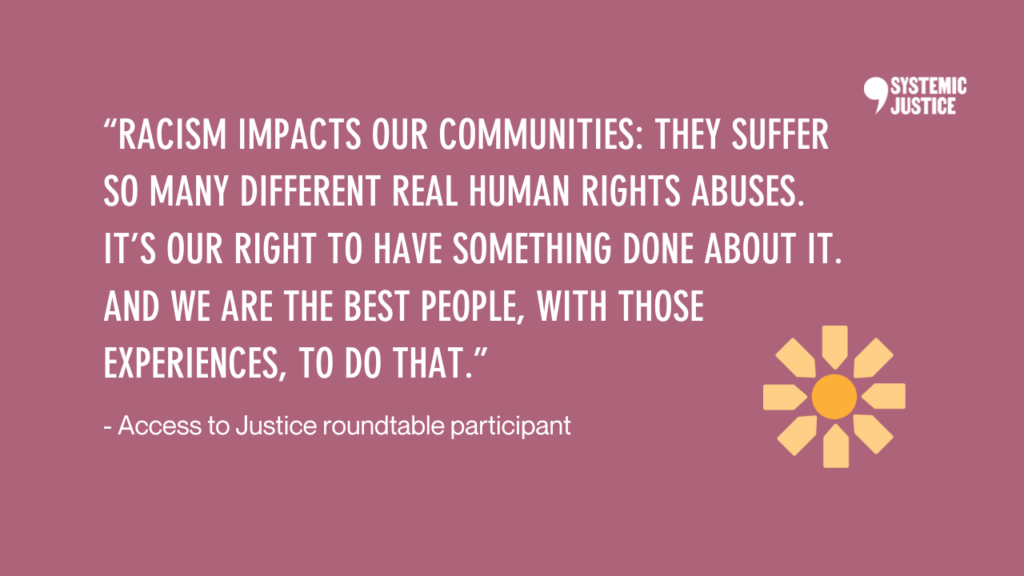
Underpinning this is a misconception of who is best placed to assess how the law can be part of addressing structural problems. This misconception comes from our deep-seated belief that “expertise” looks a certain way: a law degree, lots of theoretical knowledge, a fancy firm or chambers, erudite legal filings; and that those holding this expertise are best suited to navigate the legal systems we’ve created. This creates a monopoly for those “experts” – lawyers – in navigating these systems.
From a purely technical viewpoint, that is perhaps an argument you can make. But in making that argument, it is important to then also look at the roots of our legal system and recognise it as an elitist system that is aimed to serve those holding power and privilege.
How does this “law first” approach manifest itself in strategic litigation as we see it taking place today?
To begin, a “law first” approach is unable to fully connect with a more holistic view of what justice means or how it can be achieved. Justice is one of the foundational values underpinning our work, alongside intersectionality and anti-oppression, and we defined it as follows:
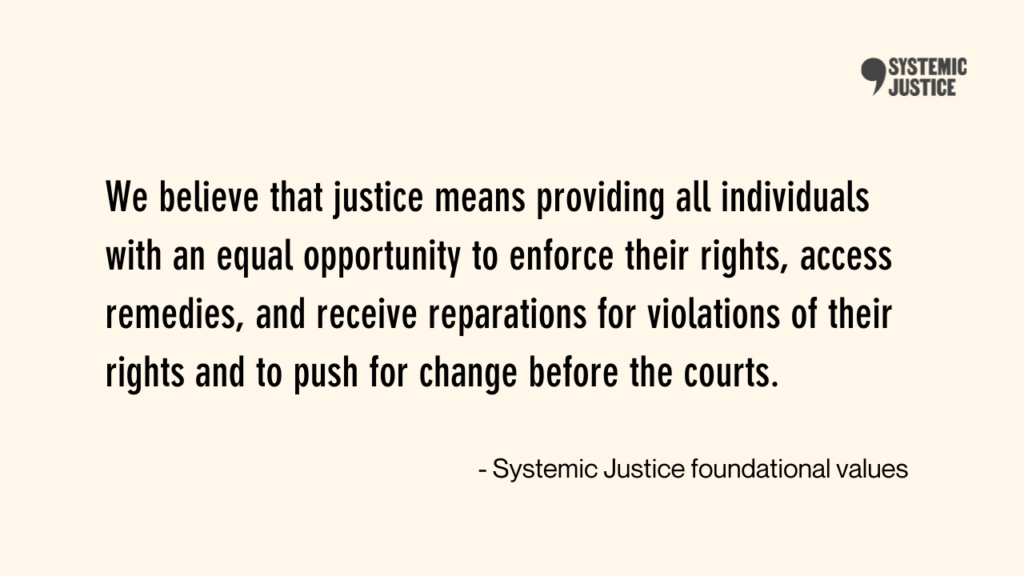
Justice exists beyond legal frameworks and social contracts, and it is distinct from legal constructs such as rights and duties. There are numerous rights and duties that have existed (and still exist) in law that cannot be deemed “just”. Laws throughout history have authorised and encouraged systems of oppression and inhumanity, from legitimising slavery, promoting segregation and other forms of discrimination, upholding the death penalty, and criminalising people’s sexual orientation, relationships, and means of survival. Our legal frameworks and the rights and obligations they create are merely the tools society uses to try to attain justice, and they will only be as fair, accessible, and effective as those who hold power in society want them to be. This means we can never truly and fundamentally equate legal “wins” with justice.
Taking the more narrow “law first” view leads amongst others to a fear of “losing” cases, which could mean foregoing litigation opportunities that could serve the bigger cause being pursued. When looking at strategic litigation as part of a bigger campaign instead of a one-off, headline-grabbing case, a lot becomes possible. Strategically undertaking litigation to spark a public debate or even public outrage, for example. Or to put pressure on lawmakers who can bring about the bigger change being pursued. Or to restore power to communities who are perhaps being disenfranchised in other aspects of public life.
A focus on winnable cases and setting “good” legal precedent in turn feeds into a fixation on finding “perfect” test cases with “perfect” plaintiffs. Anyone who takes an honest look at how the power structures in our societies work will know that this means that those who are in a position of privilege and power will be much better placed to access the legal system. They will be less surveilled, less policed, less severely punished if found culpable of any wrongdoing. The same act that results in a “tusk tusk” and severe finger wagging for one person can mean a heavy conviction and a criminal record for another, based on how they are ascribed race, class, gender, economic status, and so on.
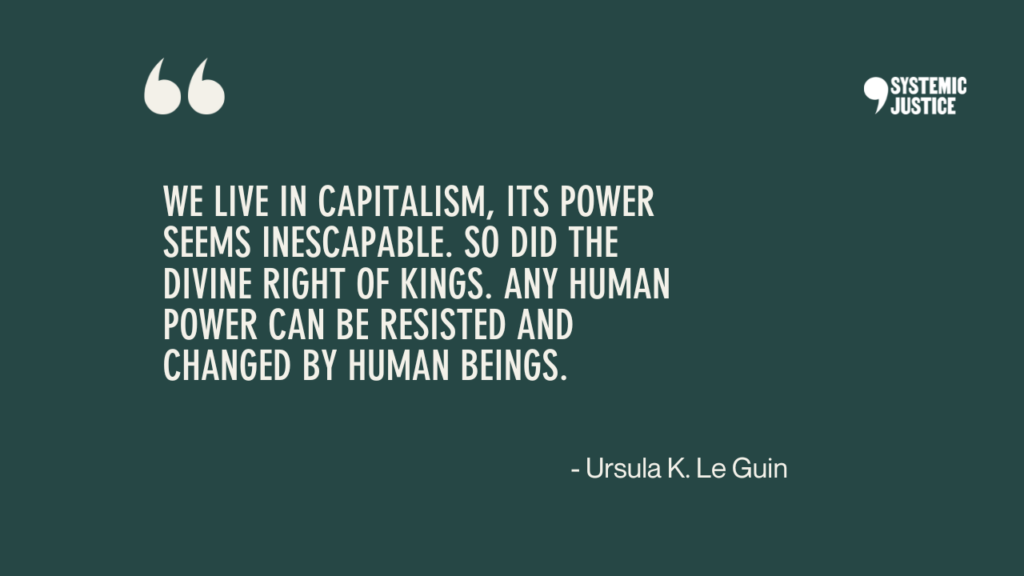
Finally, the “law first” approach can lead to a limited concept of what redress means. In our current world system, capitalism sets the terms for just about everything. That is also visible in the legal system: outside of remedies such as striking down laws and seeking non-repetition of human rights violations, requests in lawsuits tend to be framed in monetary terms. Claimants request damages for harms suffered such as lost income, emotional suffering, and even loss of life; and the costs they had to incur in seeking justice, such as lawyers’ fees. This “monetary framing” does not do justice to the complex reality of the impact systemic harms can have on communities and individuals; nor does it necessarily set people up well to start a meaningful process of healing. Restorative or reparative justice requires a more holistic approach than what can be done with a bank transfer.
The vision: a community-driven pursuit of intersectional justice
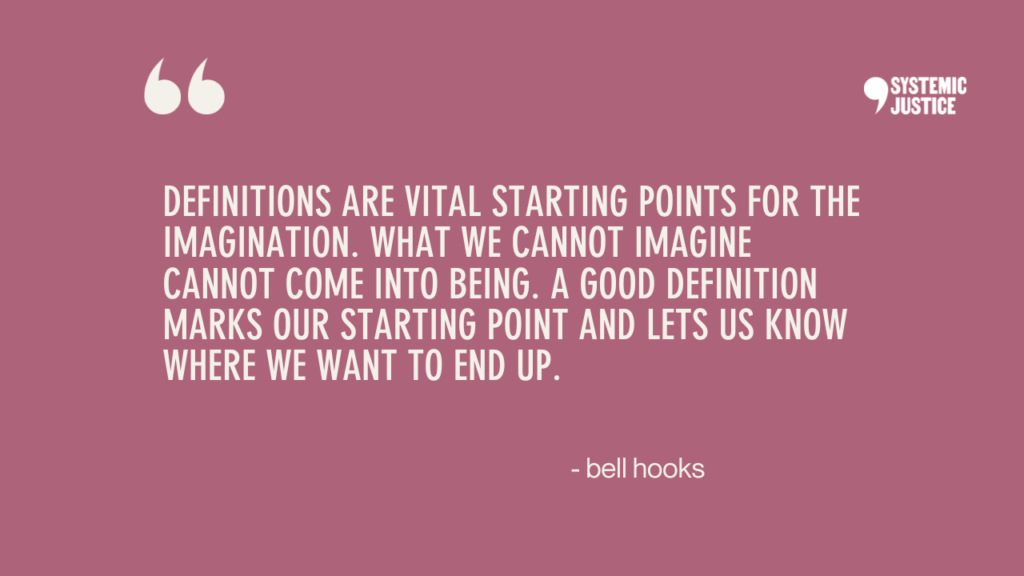
So this is the current situation as we see it. Now, how do we move on from a situation that UCLA Professors Cummings and Rhode described as “too much law and too little justice” to something different, something better?
All change starts with imagination and setting a vision for a better future. Our vision for better strategic litigation is one where that work is community-driven: where communities that are resisting racial, social, economic, and climate injustice are able to include strategic litigation in their campaigns for change and to do so on their own terms. Where communities are able to remain in their power throughout the process, with lawyers ensuring the legal work needed is done as it should.
To get there, we need to draw on existing good practices in community and movement lawyering, and build alternatives to the problematic patterns that exist in traditional lawyering models.
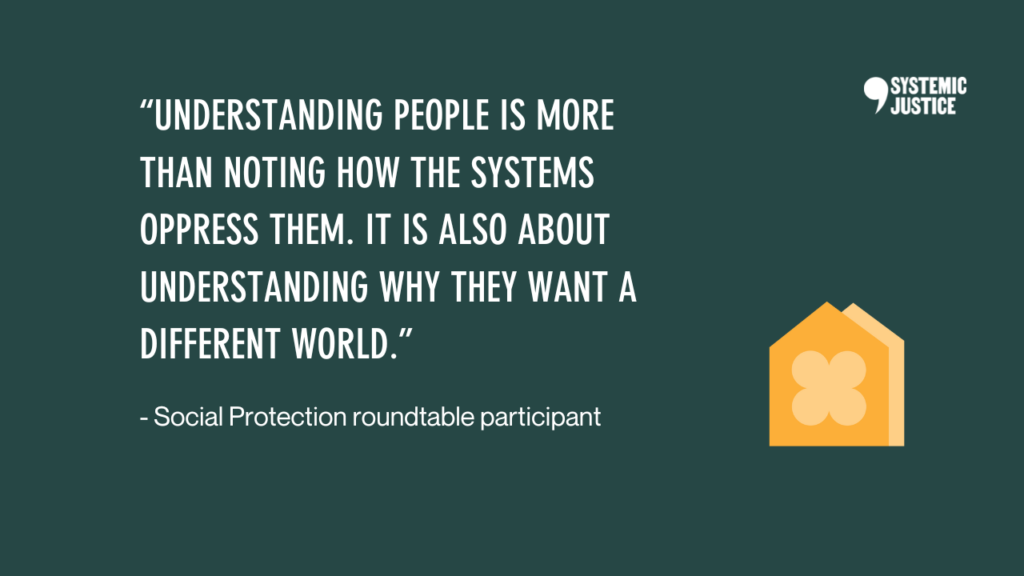
This means:
First, looking at the bigger change communities are pursuing and working out the legal strategies that serve both that change and the communities’ interests in the process.
This is something different from dreaming up the biggest, most ambitious piece of strategic litigation we lawyers can imagine, it really means starting by looking at the dream vision for the different world communities want to see come to life. So we’re talking about starting from a vision of “deliberalisation of the housing market” instead of “suing the local council for demolishing social housing” and “ending environmental racism when it comes to clean air” instead of “suing governments for failing to produce climate action plans”.
Taking that bigger vision for change as the end goal, we need to work out with our community partners (1) what the litigation options are that help build towards that; and (2) which of these options are compatible with the community’s capacity to engage with them as well as all those other components that complement litigation work to make it strategic: advocacy, campaigning, lobbying work, etc. At times, this may mean a much more steady, slow, and conservative legal strategy to “chip away at the block”. Sometimes, it will mean bringing a case that is weaker from a legal perspective, but will get an issue onto the public agenda.
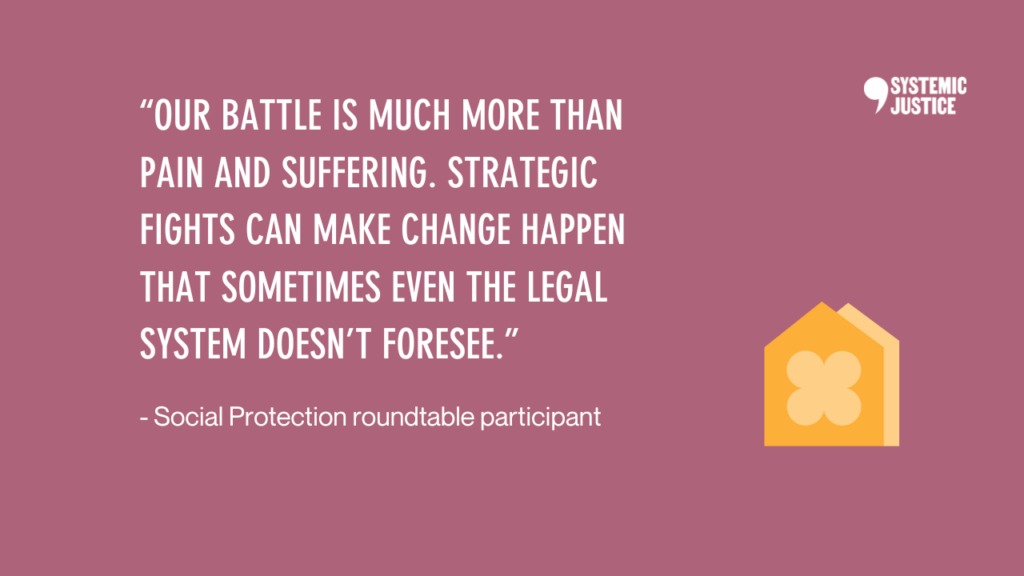
This also entails a second point, namely accepting that a loss in court can be necessary for a win in the overall campaign for change.
It may be that a point needs to be made about the system not working as it ought to, in order to set the community up for more impactful campaigning to work towards the change they want to see. Or the community may find that the process of taking a case to court in and of itself is a positive outcome despite the end result, as it can raise attention around an issue, and bring the community together to gather evidence and put its own “case” forward. If you look at other big court “wins” when it comes to racial, social and economic justice, such as campaigns for same-sex marriage, desegregation, or gender identity recognition, they have surprisingly many examples of court losses that pre-date those “wins”. While these may have been “losses” in a strictly legal sense, the reality is that these court decisions played an important role in strengthening those campaigns, rallying support, encouraging the rethinking of strategies, and exposing to the public that courts can also be complicit in upholding systemic injustices.
To be clear: I am not advocating for everyone to rush to court to set bad precedent. As lawyers, and as considerate human beings, we need to consider what consequences our actions may have for the interests of others than our clients and ourselves. But as things stand, there tends to be an at times disproportionate focus on what is “winnable” and what will set “good precedent”. Which takes us back to putting the law first, at the expense of a more holistic view. There are numerous beautiful judgments that led to no positive change in practice for those it was supposed to serve. And we need to ask ourselves why that would be an outcome we are comfortable with and why we should not be prioritising the end result for the communities we work with over a legal win we can add to our track record.
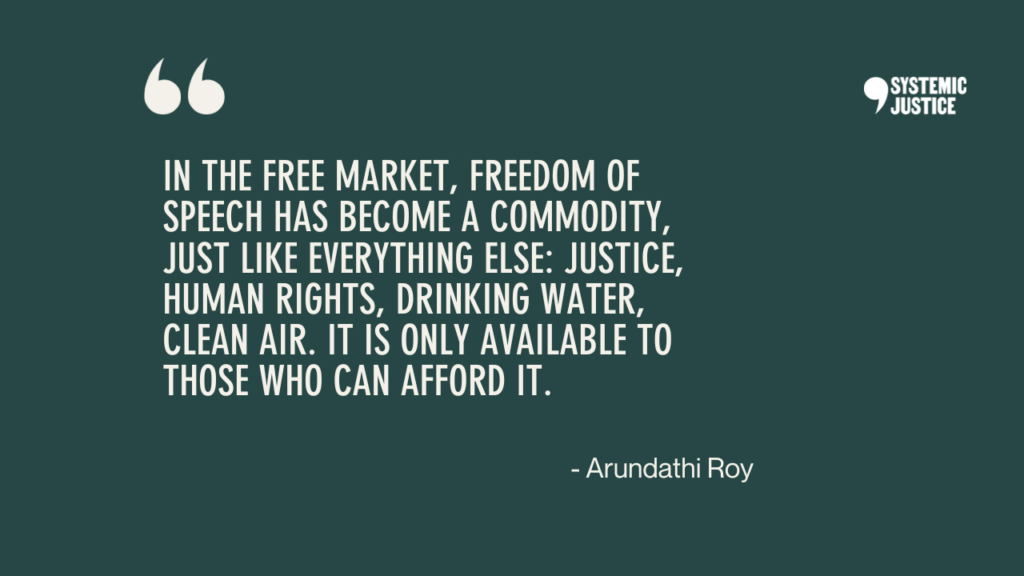
Finally, it means getting creative and thinking about and actively pursuing remedies outside the capitalist frame.
I mentioned earlier that redress, next to seeking legal orders and declarations, tends to be approached in monetary terms. Monetary compensation is not always the answer, and other measures are often better placed to foster community healing and account for trauma, such as providing access to health services, supporting community initiatives, and taking symbolic measures that communities ask for. This could take the form of commemoration, returning of land, apologies, and much more.
Of course, an obvious obstacle here is that the legal systems we work in may not always allow for remedies of these kinds. But, also here, nothing changes until we push for it. Even if requests may need to be adapted to the parameters of the local system, this does not mean we cannot start reframing the debate and putting more realistic demands – demands that correspond to the true needs of communities instead of ones that neatly fit into entrenched patterns – on the table.
The change we need to make
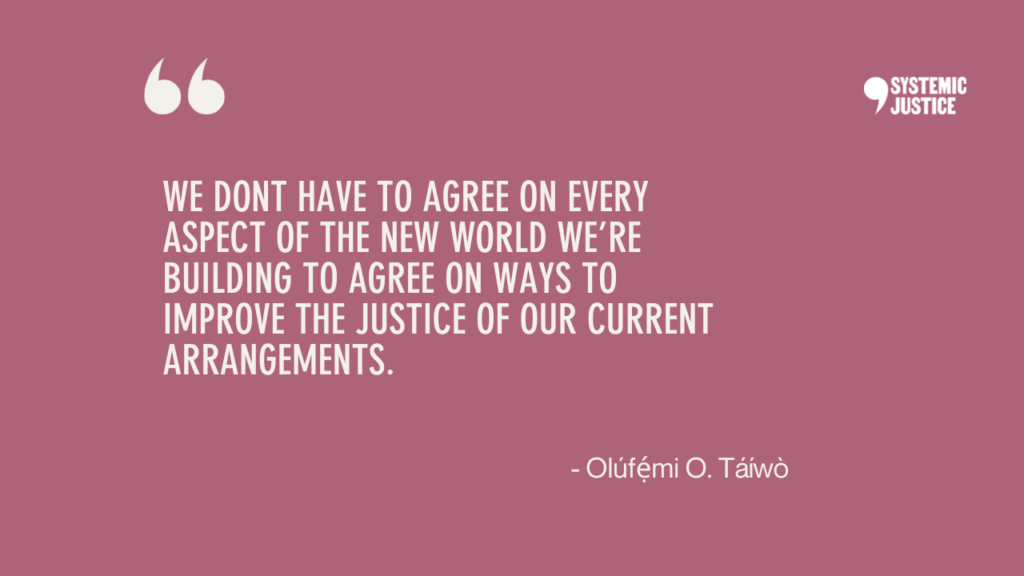
We are looking at big, systemic, radical change. The kind of change that will not happen by the actions of any one individual alone. So what are the concrete things that each of us can do to get there?
To start with what I think is the majority of the composition of this room today: lawyers.
We have work to do. First and foremost, we need to work to liberate ourselves from the comfortable throne of superiority. From our legal training onwards, we are indoctrinated with the idea that we are being initiated into, and then form part of, some sort of secret society of people who know “how the law works”. We are not that special. Our set of tools is but one of many, and we need to start seeing our work in proper perspective, and our skills and knowledge set as one of the many out there, all of which have a role to play in this world.
We need to learn to work in partnership and in deference to communities. We are not the hero of the story or of their journey towards change. They should be in the lead in the cases that concern them – you are merely a facilitator. And to be really explicit: working with anyone pro bono does not change this dynamic. At all. Whenever you feel the urge to nudge a process into a direction that lies mainly within your comfort zone or an outcome that serves your track record, ask yourself the question: if you were paid for this work, who would make the decisions? Why would this be different if you are acting pro or low bono on a case?
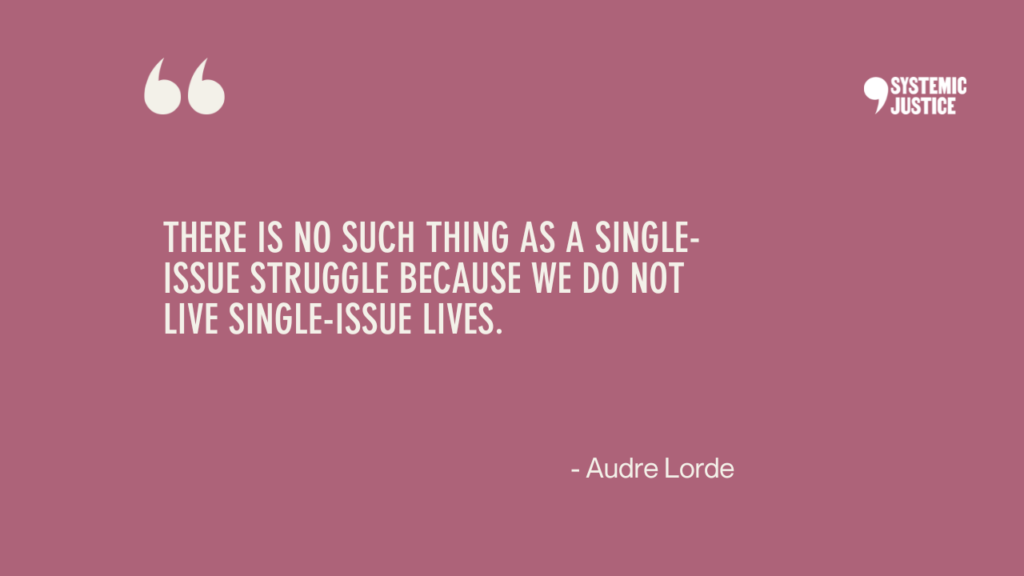
Finally, lawyers need to actively embrace intersectionality. Not as a buzzword, but actively, and push against the rigid separation we are still maintaining of systems of oppression as distinct legal concepts. When I train lawyers, I always emphasise that lawyers have a role in educating the courts by giving them an opportunity to engage with not only new questions, but also to engage with issues in a different way. Communities are not confronted with single-issue injustices – we should not sell them short by framing their resistance along a single axis.
Communities also have a role to play in this change. First, by taking ownership of your power – too often “power” is looked at with suspicion by movements and collectives because of the bad experiences they have of if being used against them. Power in and of itself is not a bad thing, as with most things, it depends on how it is wielded. This includes walking away if a partnership does not serve you. Do not let yourselves be pushed into accepting “reformist reforms” – don’t compromise on your vision for change because of a lawyer’s narrow conception of what is possible within the law. Find someone to work with who understands and can navigate the tension between the radically better future you want to live in and how the legal process can be used in the here and now to get us there.
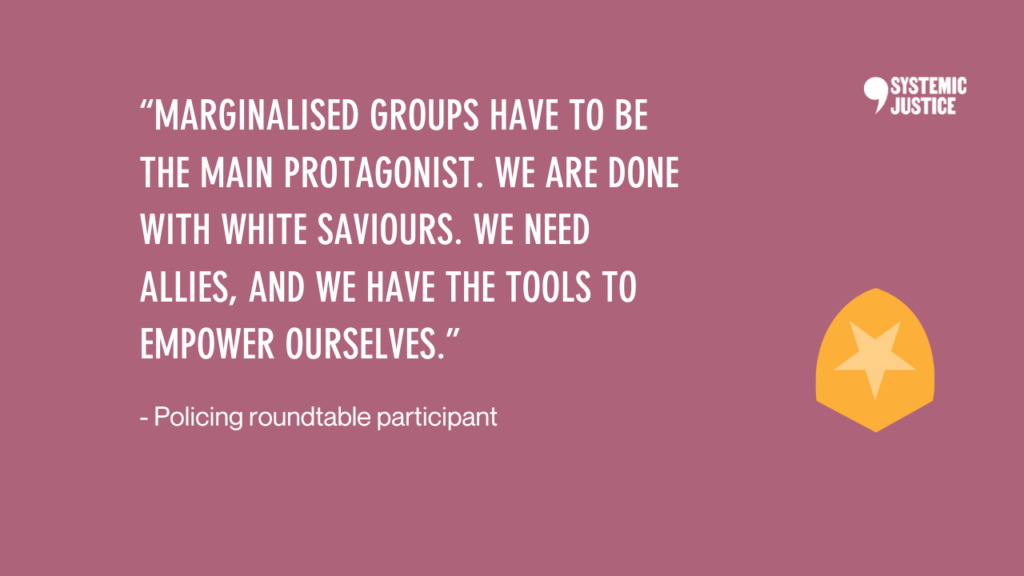
To NGOs that litigate, the points I just mentioned for lawyers apply. In addition, they can ask themselves the following three questions:
First: what are you prioritising – your mission or the interests of the communities you’re working with? Are you able to tell the difference objectively and to defer when a community’s interest does not align with your organisations interest?
Second: what are you doing to truly build power in communities? Are you able to call it when you end up conflating saviourism with being an actual ally to them?
Third: what are you doing to change the picture in the legal profession overall, which should be much more representative of all of our society? Is your organisation replicating the white middle-class hegemony of the bar? Here I’d like to emphasise that acceptance – “that is just what the field looks like” – means complicity. You have power to change this: use it.
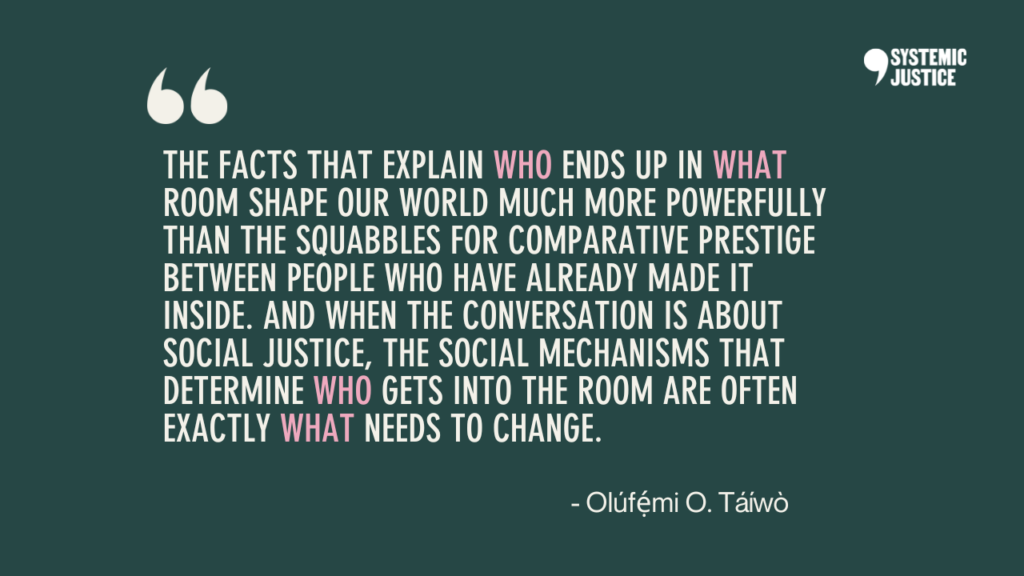
One should always tread carefully in telling judges what to do, but we cannot leave them out in this context. My main invitation there is for judges to be open to and learn about the law and justice system as systems of oppression, and to interrogate the ways the legal process perpetuates intersectional harm. Of course, this system sets the parameters for judges to operate in. Nevertheless, you have a role in using your position of privilege to use your discretion in a way that promotes communities’ access to justice. You are also able to advocate for legal reforms from within the court system that can better uplift and highlight the experience, knowledge, and expertise of communities, and ensure this gets a proper place in proceedings rather than just the views of lawyers and “experts”.
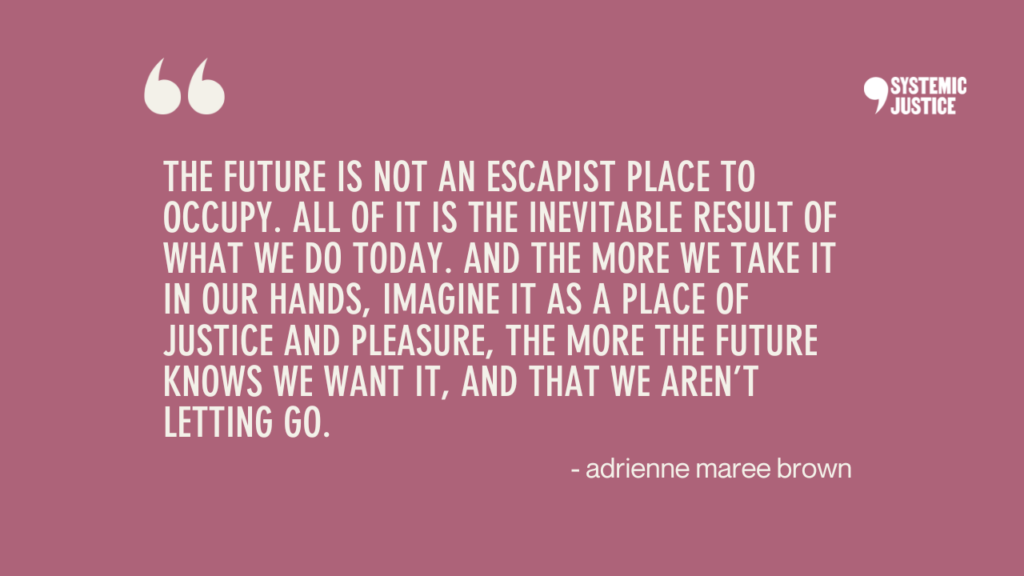
For all of us this comes down to continuously asking ourselves questions and acting upon the honest answers. What knowledge do we value? Who do we listen to? Who do we trust? Who do we centre in our work? Who gets to lead?
It is important here to acknowledge that the legal system is not an island. On the contrary, in many ways it replicates the racial-capitalist power structures of our societies. This, of course, is why the system is not serving marginalised communities at the moment.
But we also need to remember that these systems are supposed to be made by and serve all of us. Some – not all – of us made the system we are currently operating in. And we can change it.
This change will not happen overnight, and that is okay. That change will not be quick is no reason for any of us to not work towards it. Audre Lorde wrote: “Revolution is not a one-time event. It is becoming always vigilant for the smallest opportunity to make a genuine change in established, outgrown responses.”
I hope you will join me in this revolution. The world needs it.
